Will “hard work” and “opportunity for all” get Ontario Liberals through 2012?
Jan 23rd, 2012 | By Randall White | Category: In Brief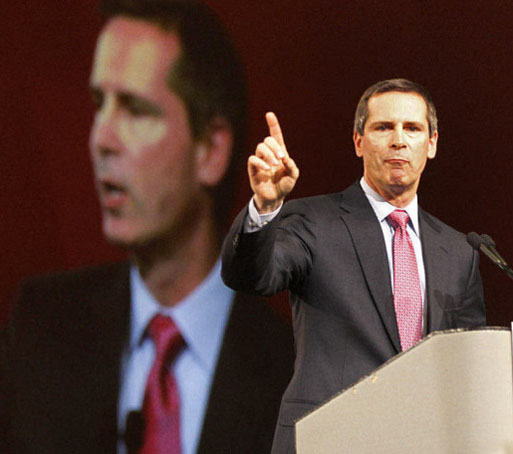
Dalton McGuinty speaks at the Liberal Party of Canada Convention in Ottawa, January 13, 2012. Peter Power/The Globe and Mail.
[UPDATED JANUARY 24]. Ontario Liberal Premier Dalton McGuinty’s welcoming speech was one of the highlights at the Liberal Party of Canada’s biennial convention in Ottawa, more than a week ago now, on Friday, January 13, 2012. One of its most striking passages, I thought, came somewhat before the middle: “Choosing a new leader is no quick fix. I am living proof of that. There are no saviours. There are no overnight successes. There is only hard work. Lots of it.”
Premier McGuinty’s penchant for this kind of rhetoric remains one of his strengths, in the political culture of his home and native most populous province of Canada. It reminded me of the Latin motto of my old Ontario high school: “Labor Omnia Vincit.” (Or for younger generations no longer required to study the dead language of the Roman empire, “Work Conquers All.”)
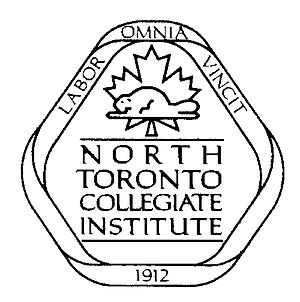
Dalton McGuinty attended St. Patrick’s High School in Ottawa. Its Latin motto is Religio Alit Artes (Religion Nourishes the Arts) – which has similarities to Labor Omnia Vincit, and probably to the motto of most other Ontario high schools too.
Back at Queen’s Park in Toronto, during the work week of January 16—20, there were a few good reasons to wonder whether lots of hard work will be enough to conquer the challenges the new McGuinty “major minority” government is facing in the year ahead. To start with: “In the first major poll since the Oct. 6 election, the Conservatives, led by Tim Hudak … are at 41% to the Liberals’ 33%. The New Democrats, led by Andrea Horwath, are third with 20% and Mike Schreiner’s Greens are at 4% … in terms of approval rating, Horwath leads with 40%, McGuinty is at 33%, and Hudak trails with 26%.”
Opinion polls on Ontario provincial politics often reflect confusion between federal and provincial politics in the minds of Ontario voters – especially when no provincial election is close at hand. And this confusion is recurrently inspired by such Ontario politicians as Premier McGuinty himself, with the ringing peroration to his January 13 speech in Ottawa:
“When Liberals do once again earn the privilege of serving as the government … we’ll win because Canadians will see that Liberals have no greater desire, no greater ambition, than to put our country first … in all we do and say we’ll have demonstrated our faith in Canada … inspired by … our determination to build opportunity for all, right here in Canada.”
Lorne Bozinoff, president of the Forum Research organization that has conducted the first major Ontario poll since the October 6 election (when the Conservatives actually managed a mere 35.4% of the popular vote, compared with the Liberals’ 37.6% and the New Democrats’ 22.7%), has nonetheless proffered a more substantive explanation for the McGuinty Liberals’ latest poor polling numbers.
As explained in the Toronto Star: “‘I don’t think the talk of restraint has gone that well … People are getting very uneasy … ’” The Star goes on: “That’s a reference to former TD Bank chief economist Don Drummond’s looming report on government reform, which will help shape Finance Minister Dwight Duncan’s March budget … Bozinoff said the austerity chatter is hurting the Liberals, coming as it does against the backdrop of revelations in the Star about the ORNGE air ambulance service … ‘It’s just the wrong image right now,’ he said.”
One might reasonably wonder why, if Lorne Bozinoff is right on the money here, voters are more happy with Conservatives who would presumably go still further down the restraint and austerity highway? But then there is again the confusion factor between federal and provincial politics – and more significantly the confusing party leader approval ratings, which put the NDP’s Andrea Horwath first and the Conservatives’ Tim Hudak last!
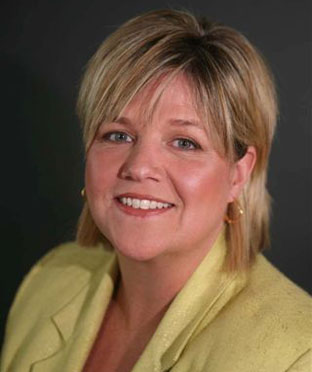
Ontario NDP leader Andrea Horwath – finished first in leader approval rating segment of Lorne Bozinoff’s latest poll.
In any case, I find myself wanting to stir two additional ingredients into the current mixture. The first is a January 9 New York Times column by the reasonable American conservative David Brooks. It is entitled “Where Are the Liberals?”, and it focuses on the belief of some North American voters today that “to put it in the economists’ language … the government has been captured by rent-seekers.”
The second is an unscientific sample of conversations with younger Ontario public servants I haphazardly bumped into at recent holiday season events, about just what it is like these days inside Ontario’s particular regional variation on the rent-seeking bureaucratic culture.
“Don Drummond’s looming report on government reform in Ontario”
A concise report by Linda Diebel in this past Saturday’s Toronto Star does a tidy job of summarizing what we the general public know so far about former TD Bank chief economist Don Drummond’s looming report on government reform in Ontario :
“In a career brimming with plum positions, Drummond calls this one his ‘dream job.’ McGuinty put him in charge of a commission on the public service with the power to affect all our lives in Ontario with a series of recommendations to find ways to raise money, as well as pinpointing the inevitable cuts … More than 400 recommendations include consolidation of some ministries, overhaul of others and a major reorganization of medical services …”
Ms. Diebel’s report also notes that Don Drummond’s brimming career includes a plum sojourn with the federal department of finance in Ottawa, where “Michael Wilson, finance minister in Conservative Brian Mulroney’s government” found him “‘a pretty broadly based guy … Very capable … I always paid attention when he spoke … He’s one of the most principled and imaginative public servants with whom I have ever worked.’”
Ms. Diebel notes as well that: “With great glee recently, Drummond sent around a blurb from Inside Queen’s Park [the estimable Graham Murray’s Ontario politics newsletter of record] in which he’s described as ‘this determined economist with a remarkably strong jaw-line.’”
Just how much attention will Premier McGuinty be paying to Mr. Drummond’s recommendations? Ms. Diebel writes: “McGuinty recently stressed that it’s Drummond’s role to ‘advise’ and his to ‘decide.’ That’s true … And it could well be that some controversial ideas” will go “down in flames. But don’t bet on it … Because this has been, above all, a textbook exercise in symbiosis between commissioner and premier. Drummond has kept McGuinty and his line ministers in the loop every step of the way …”
And yet, it also seems fair to suggest, it is in the nature of these exercises that you never really know just what will happen to them until after they become public. Politicians commission such things to help them get around landmines. No prior textbook exercises in symbiosis can finally insulate the authors from potential explosions …. in the interest of politicians concerned to put our country first, and build opportunity for all, right here in …. er, fill in the blank. (And if Lorne Bozinoff is right that “people are getting very uneasy” about “the talk of restraint” … UPDATE JANUARY 24: At the same time, just today “Dalton McGuinty warns Ontarians leaner times are looming.”)
Does the new “rent-seeking” bureaucratic culture in Ontario run deep enough to create some real problems for Mr. Drummond’s recommendations?
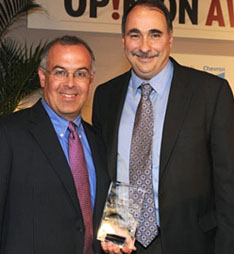
David Brooks (l) with Obama administration official David Axelrod, at The Week's "Sixth Annual Opinion Awards," April 2009.
The interest of David Brooks’s January 9 column on the widespread view that “to put it in the economists’ language … the government has been captured by rent-seekers,” I think, is that it puts its finger on an issue I seem to recall hearing Don Drummond allude to on TV. But I can remember thinking at the time that Mr. Drummond never did quite explain how his recommendations may or may not handle the increasingly thorny rent-seeking problem.
The backdrop of recent revelations in the Star about the ORNGE air ambulance service also illustrates an aspect of the problem that especially enrages ordinary voters. Rather than get into the details here, I will just cite several recent and earlier articles on the ORNGE air ambulance and related issues:
“Deb Matthews unlikely to be given a pink slip over Ornge controversy” ; “Ontario Premier’s office ignored red flags over ORNGE raised one year ago” ; “ORNGE wasted $600,000 on empty hangar” ; “EHealth scandal a $1B waste: auditor” ; “eHealth scandal claims health minister” ; and “Ontario tightens rules for use of consultants.”
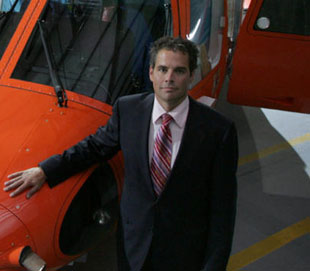
Air ambulance provider ORNGE’s founder and former president, Dr. Chris Mazza. The Toronto Star revealed that he earned $1.4 million a year, making him the highest paid executive at a publicly funded organization in Ontario. ORNGE receives $150 million a year from Ontario taxpayers. RON BULL/TORONTO STAR FILE PHOTO.
My unscientific sample of conversations with younger Ontario public servants I haphazardly bumped into at recent holiday season events, about just what it is like these days inside Ontario’s particular regional variation on the rent-seeking bureaucratic culture, covers what seem to me at any rate related but somewhat different issues.
So … to start at the beginning, the problem with liberalism in North America today, David Brooks suggests, is that its chosen instrument of government action, on behalf the 99% (well 90% anyway?) who don’t reap inordinate benefits from the increasingly greedy private sector action promoted by a great deal of public policy in many English-speaking and other places since the late 1970s and early 1980s, has over the past several decades been “captured by rent seekers.”
The people who organized such boondoggles as ORNGE and eHealth in Ontario are good examples of rent seekers – out for their own interest, and not really concerned about putting our country first, and building opportunity for all. No matter how upright and hard working the politicians are (and who would deny that Premier McGuinty qualifies impressively under both headings), a government that has actually been “captured” by rent seekers, in David Brooks’s language, will not be able to implement the liberal political and economic agenda successfully.
Until recently, I suppose, I have tended to think that in Dalton McGuinty’s Ontario this problem was largely confined to quasi-government or public-private agencies at the fringes of the so-called enrolled public service proper. What has been put into my head by my unscientific sample of conversations with younger Ontario public servants I haphazardly bumped into this holiday season is the thought that the dysfunctional rent-seeking culture has now permeated or is now permeating the enrolled Ontario public service itself (much to the distress of more than a few enrolled public servants).
I hope I am wrong about this. But I think it is a worrying prospect – and especially for “former TD Bank chief economist Don Drummond’s looming report on government reform, which will help shape Finance Minister Dwight Duncan’s March budget.” Reading Linda Diebel’s tidy report in this past Saturday’s Toronto Star, you might think that all Mr. Drummond has to do to make his government reforms work is win over the decision-making politicians in cabinet and their senior civil servants – keep them in the loop, as the lingo goes.
Yet unlike so much of the Canadian federal government, provincial governments in Canada actually deliver public services (beyond the no doubt important enough service of mailing cheques to various worthy Canadians). Based on what little we in the general public know so far about Mr. Drummond’s plans, to succeed they are going to require the enthusiastic co-operation of the middle, working levels of the Ontario public service too.
And if David Brooks’s rent-seeking culture really has captured some great chunk of the Ontario government in this sense, implementing Mr. Drummond’s mandate – no matter how clever and innovative his recommendations – could prove very difficult indeed.
Of course, it is always possible to go back to the just charge-ahead “creative destruction” approach to public sector reform of the Mike Harris Conservatives in Ontario – apparently also advocated by the successor Tim Hudak Conservatives nowadays. But Dalton McGuinty became and remains premier, because a substantial majority of Ontario voters finally decided this approach does not work.
Premier McGuinty has asked Don Drummond to look into things, presumably, because he’s hoping to get something different from Mike Harris’s creative destruction. Whatever else, it will be very interesting to see what happens between now and Finance Minister Dwight Duncan’s March budget. (And oh, btw, and of course again, the McGuinty Liberals of 2012 do not quite have a majority in the Ontario Legislative Assembly. To get any budget shaped by Mr. Drummond’s recommendations passed will requite the co-operation of some opposition party – even if Mr. McGuinty did make it quite clear in Ottawa on Friday, January 13 that he does not want the Liberals in any incarnation to “merge” with anyone.)






